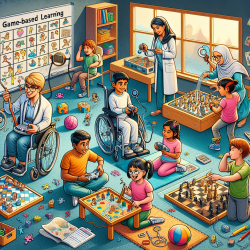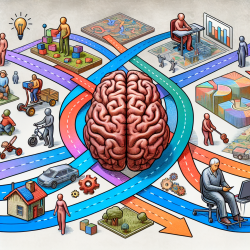As practitioners dedicated to improving outcomes for children, it is crucial to understand the broader context of health disparities that impact communities. The research article "Alzheimer’s Disease and Alzheimer’s Disease-Related Dementias in African Americans: Focus on Caregivers" offers valuable insights into the challenges faced by African American caregivers. This blog post will explore key findings from the study and provide actionable recommendations for practitioners to enhance their caregiving skills and encourage further research in this critical area.
Understanding the Unique Challenges Faced by African American Caregivers
Alzheimer’s Disease (AD) and Alzheimer’s Disease-Related Dementias (ADRD) disproportionately affect African Americans. Several factors contribute to this disparity, including genetic predispositions, socioeconomic status, and access to healthcare. The research highlights that African American caregivers often face significant stress and challenges compared to their white counterparts. This is due to a combination of cultural, social, and economic factors that impact their caregiving experience.
Key Findings from the Research
- Genetic Factors: The study identifies that genes like APOE and ABCA7 are linked to a higher risk of AD in African Americans. Understanding these genetic predispositions can help in developing targeted interventions.
- Socioeconomic and Environmental Factors: Disparities in healthcare access, education, and economic stability significantly affect the quality of care African American caregivers can provide.
- Cultural and Social Influences: Cultural values and social networks play a crucial role in how caregiving is perceived and managed within African American communities. These factors can both support and challenge caregivers.
Recommendations for Practitioners
Based on the findings, here are some actionable recommendations for practitioners to enhance their caregiving skills and support African American caregivers more effectively:
- Increase Awareness and Education: Provide educational resources that are culturally relevant and accessible. This includes information on genetic risks, caregiving strategies, and available support services.
- Promote Community Support: Encourage the formation of support groups within African American communities. These groups can provide emotional support and practical advice, reducing caregiver burnout.
- Advocate for Policy Changes: Work towards policies that address healthcare disparities and improve access to quality care for African American patients and their caregivers.
- Utilize Technology: Leverage online therapy services, like those provided by TinyEYE, to offer remote support and resources to caregivers who may have limited access to in-person services.
Encouraging Further Research
While this study provides valuable insights, there is a need for further research to fully understand and address the challenges faced by African American caregivers. Practitioners are encouraged to engage in and support research initiatives that explore these disparities and develop effective interventions.
To read the original research paper, please follow this link: Alzheimer’s Disease and Alzheimer’s Disease-Related Dementias in African Americans: Focus on Caregivers










